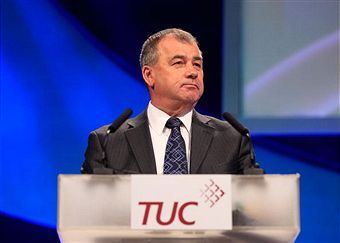 Strolling through central Birmingham yesterday, I came across one of those brewery
advertisements from the early part of the last century. “Unspoilt by progress,” it boasted – a slogan that popped into my head when I heard the unions’ various interventions this
morning. As Iain Dale suggests, there is something very 1970s about what Crow, Barber, Serwotka & Co. are saying today.
Strolling through central Birmingham yesterday, I came across one of those brewery
advertisements from the early part of the last century. “Unspoilt by progress,” it boasted – a slogan that popped into my head when I heard the unions’ various interventions this
morning. As Iain Dale suggests, there is something very 1970s about what Crow, Barber, Serwotka & Co. are saying today.
The coalition will need to meet much of the unions’ belligerence with some fire of its own. David outlined some ways it can do that earlier. But, to my mind, there is one charge that demands a
particularly ferocious counterattack. It’s the one made by Brendan Barber in his article for the Independent
today:
“Yesterday, the TUC published research showing that the cuts will fail the same fairness test as the poll tax. The poorest 10 per cent will lose 13 times more than the top 10 per cent from the cuts the coalition plan.”
This is a powerful allegation not just because it quantifies the kind of worries which could have Lib Dem MPs fleeing the coalition – but because it is supported, more or less, by other organisations like the Institute for Fiscal Studies. Even bodies with no ostensible political leanings have graphs and charts showing how Osborne’s cuts are “regressive”.
I’ve written before about why we should be sceptical of these analyses. The basic point is that, even if they are correct on their own terms, they do not account for policies which lie outside an accountant’s idea of money in and money out. Schools reform, welfare reform, a growth in private sector jobs – all of these should help the poor, but they aren’t factored into Barber’s argument. So long as this remains a fight about public sector jobs and benefit cuts, then the coalition will always be open to the charge that one group or other – the North, the least well-off, women, etc. – will be “unfairly” affected by their Budget.
To be fair, the coalition have begun a fightback. Nick Clegg’s recent article in the FT , for instance, was judged to perfection. But he and his colleagues have an entire field of hurdles set before them. In the last Budget, George Osborne claimed that his measures were “progressive” by providing an IFS-style graph of the winners and losers from the cuts and tax changes. He will, you imagine, have to provide the same graph in future – which could just validate the attacks of the coalition’s opponents, even as the coalition tries to counter them.
When I say that this is the most important battle the coalition will face, I have in mind not the battle with the unions – which is only one dimension of it – but the battle to paint the cuts as either “good” or “bad”. Barber is demonstrating just how he will exploit that to incite and mobilise dissent. Labour will follow suit. The coalition shouldn’t let them frame the debate through sheer bloodymindedness.






Comments